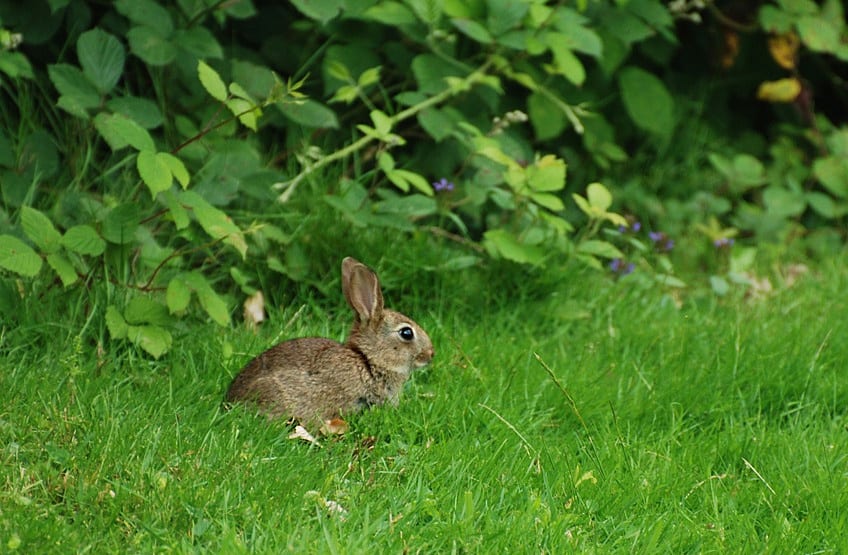People think of “rabbit food”, and they think of salad. But like all animals, rabbits need to stick to a highly specific diet if they’re to stay healthy and happy. Find out more about your rabbits diet.
How to tell if you're feeding your rabbit correctly
The quickest and easiest way to judge whether your rabbit’s getting a healthy diet is to think of wild rabbits. Wild rabbits are small, lithe, and quick.
They never suffer from dental problems, they never experience digestive upsets, and they’re never, ever, ever overweight.
This is because they subsist on a diet of grass, both fresh and dry, as well as a wide variety of weeds and leaves. They spend most of the day chewing and exercising. The more your pet rabbit can feed like a wild rabbit, the healthier they’ll be.
So, our pet rabbits, (who frequently suffer from the above problems) will be healthier if they are fed more like wild rabbits. Obviously most pet rabbits will not be able to run around grazing all day, so we have to make a few adjustments.
What does rabbits diet consist of?
Aim to feed your rabbit with a good mix of high quality grass and hay, as well as a wide variety of vegetables, weeds, and leaves.
Hay and grass should make up the majority of your rabbit’s diet, as it contains indigestible fibre that’s vital for your rabbit’s gastro-intestinal health. It will also keep your rabbit’s constantly-growing teeth in good shape. If you’ve got a lawn, let your rabbit graze for a while every day.
Not only will this give your rabbit the sustenance they need, it will also enable them to get some much-needed exercise – essential for good digestion and for preventing obesity. If this isn’t possible, make a point of picking some fresh grass for your rabbit each day instead.
Never feed your rabbit lawnmower clippings, as they’ll cause digestion problems.
Complement the daily intake of grass and hay with small selections of carefully chosen vegetables, weeds, and leaves:
- Cruciferous vegetables – cabbage, cauliflower, broccoli, sprouts
- Spring greens
- Kale & parsley
- Carrots and carrot tops
- Green beans
- Pea-leaves
Appropriate leaves and weeds include:
- Fruit-free leaves and twigs
- Hazel leaves
- Dandelions
- Brambles
- Clover
- Dock
Meanwhile, you should avoid feeding your rabbit the following:
- Banana
- Apple
- Iceberg lettuce
- Tomato
- Sugary treats
These items are low in fibre and high in sugar, which makes them almost the opposite of what your rabbit needs. And it should go without saying that rabbits need continuous access to clean drinking water. You should change their water twice a day, and more during the winter months, to make sure it doesn’t freeze.
What about commercial rabbit food?
Many pet shops sell commercial pellets or muesli for rabbits.
The best commercial rabbit food contains complete pellets that all look identical.
This indicates that it’s balanced. However, certain brands of commercial rabbit food contains a mixture of ingredients, not all of which are good for your rabbit.
Feeding your rabbit exclusively on commercial rabbit food can result in a number of problems:
- Over-Feeding – Rabbits should never eat more than 3% of their bodyweight in commercial rabbit food in any 24 hour period. Anything more than this can lead to obesity and a reduced fibre intake, which can in turn result in dental disease and a range of digestive problems.
- Selective Feeding – An over-reliance on mixed commercial rabbit foods can cause rabbits to become defective in certain essential nutrients, particularly calcium – which of course is crucial for good dental health.
So if you’re going to feed your rabbit commercial rabbit food, make sure you:
- Choose a balanced brand containing identically-shaped pellets – avoid muesli style foods at all costs
- Follow the manufacturer’s feeding instructions to the letter
- Never top up your rabbit’s bowl – if they gorge on pellets, they won’t want any grass!
My rabbit keeps eating its droppings…
This is perfectly natural! Rabbits produce two types of pellets – hard and soft. The softer pellets are dietary essentials. The technical term for them is caecotrophs. But nonetheless, you should keep an eye on your rabbit’s droppings. If they should ever decrease in volume, or even stop completely, let your vet know immediately. This could indicate serious illness. You should also be wary of soft droppings that stick to your rabbit’s back end.
Switching your rabbit to a healthy diet
All big dietary changes must be made gradually, over the course of a few weeks. A sudden change can result in a loss of appetite and some nasty digestive problems.
Some rabbits will need slightly different diets. For example, pregnant rabbits, nursing females, young and growing rabbits, and rabbits with certain diseases, will each need to consume different food in different qualities.



Our Services